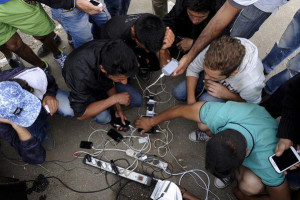Technology and the refugee crisis

Cellphone lifeline: refugees wait at border of Greece and Macedonia (Image: Reuters/Alexandros Avramidis)
For the tens of thousands of migrants flooding into Europe, smartphone maps, global positioning apps and social media have become essential tools.
Food, water and shelter are the basic needs for the millions across the globe displaced by war. But another thing that is vital to them is a smartphone charging station.
Technology has transformed the world’s most recent refugee crisis by making it easier for millions more people to move. The digital connectivity has increased the pressures on routes that are proving successful; like the one through Macedonia and Serbia which the United Nations says 3000 people are using to cross every day.
Migrants depend on smartphones to post real-time updates about routes, arrests, border guard movements and transport, as well as places to stay and prices, all the while keeping in touch with family and friends.
The first thing many do once they have successfully navigated a perilous ocean voyage somewhere in the world is pull out a smartphone and send loved ones a message that they are safe.
Reports say that much of the change is driven by the tens of thousands of middle-class Syrians who have been displaced by war.
But smartphones are not limited to them, and are also used by migrants from Africa and the Middle East to Afghanistan and Pakistan.
Syrians are also being helped along their journeys by Arabic-language Facebook groups like ‘Smuggling Into the EU’, with 23,953 members, and ‘How to Emigrate to Europe’, with 39,304.
The discussions are both public and private, requiring an invitation from a group administrator. Migrants share photos and videos of their journeys taken on their smartphones.
Traffickers are also using digital technology; advertising their services on Facebook like a travel agent might, complete with photos of destinations and special deals.
Disguised as a fancy advert for tourist trips with pictures of Paris’ Eiffel Tower or Britain’s Houses of Parliament, the Facebook pages offer a “safe” passage to thousands of families who are willing to risk their life savings on the hope that they will reach Europe.
And the traffickers are now playing on migrants’ fears by offering expensive package deals that guarantee “100%” safety after thousands have died crossing the Mediterranean this year.
One page, titled “Safe Journey from Turkey to Greece” claims its clients will board a 130ft yacht, called the Orient Bosphorus, in the Turkish port, Izmir – at a cost of $5000.
Migrants are often told it is “forbidden” to bring any luggage or wear headscarves in order to disguise themselves as westerners.
The traffickers even suggest that their “customers” take laptops and digital cameras to help them look like tourists if they are questioned by authorities.
On the Arabic-language Facebook group Trafficking to Europe, one trafficker offers a 50% discount for children under five. The 1,700 euro price of the journey from Istanbul to Thessaloniki, Greece, about $1,900, includes travel by car to and from each side of the border with a two-hour walk across.
“We have cars going every day,” the trafficker boasts. One user asked whether there was a family discount for multiple passengers. And in case one doubts the offer’s veracity, the post has 39 “likes.”
While all this is happening technology is also transforming the ways refugees and international aid agencies interact, even before the refugees enter Europe.
The Office of the United Nations High Commissioner for Refugees (UNHCR) has distributed 33,000 SIM cards to Syrian refugees in Jordan and 85,704 solar lanterns that can also be used to charge cellphones.
“For the UNHCR, there is a shift in understanding of what assistance provision actually is,” said Christopher Earney of the refugee agency’s innovation office in Geneva.
Laurie Nowell
AMES Australia Senior Journalist












